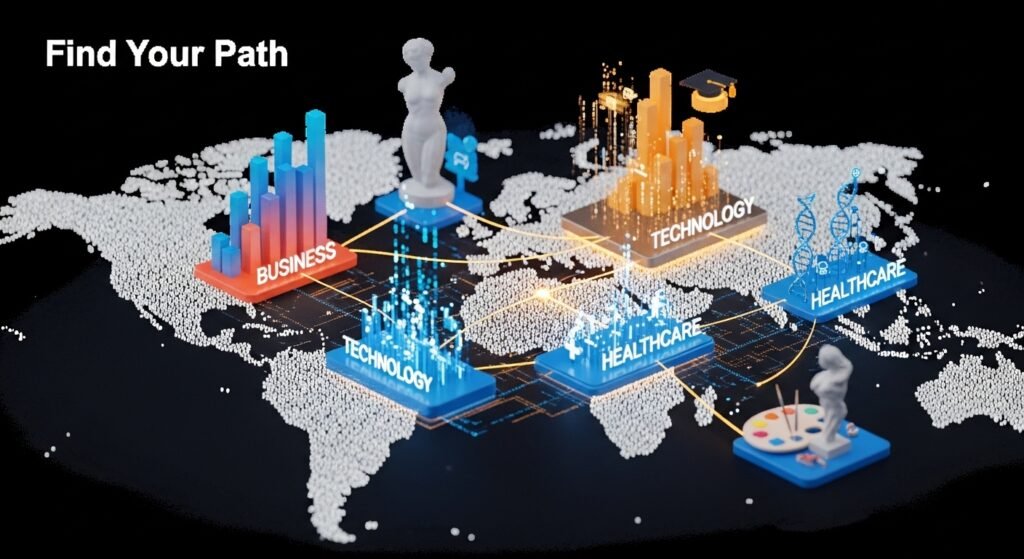Are Online Degrees Worth It in 2025? An In-Depth Look at the Future of Education
The Real Value of Online Degrees in 2025: Beyond the Digital Classroom
The lecture hall is silent, but learning is in full session. A single mother in Ohio studies advanced calculus after putting her children to bed. A full-time accountant in Texas completes coursework toward an MBA during his lunch break. An aspiring software developer in Nigeria builds coding skills through a respected American university’s program.
This is the face of modern education. The question of whether online degrees hold value has evolved dramatically. What was once seen as a secondary option has become a powerful pathway for millions worldwide. As we look toward 2025, the conversation has shifted from “Are online degrees legitimate?” to “How can I choose the right online degree program for my goals?”
Having advised hundreds of professionals on educational choices and witnessed the transformation of digital learning firsthand, I’ve seen the landscape change from skeptical acceptance to enthusiastic embrace. The pandemic didn’t just temporarily shift education online—it permanently altered how we perceive digital learning.
The Transformation of Perception: From Skepticism to Acceptance
The evolution of online degrees in the academic world represents one of the most significant shifts in education history. Where employers once questioned the validity of digital credentials, many now recognize the unique strengths these programs develop.
Recent data from the National Center for Education Statistics shows that enrollment in online degrees has stabilized at levels 50% higher than pre-pandemic figures. This isn’t just a temporary spike—it’s a permanent restructuring of how we approach education.
The hiring managers I speak with consistently note that candidates with online degrees often demonstrate exceptional time management, self-discipline, and technological adaptability—skills increasingly valuable in today’s workplace. As remote work becomes standard across industries, the experience of earning online degrees directly mirrors the modern professional environment.
How to Apply for Study Abroad Programs in the USA 2025 Guide

The Compelling Advantages of Online Degrees
The benefits of pursuing online degrees extend far beyond simple convenience. These programs offer tangible advantages that traditional education often cannot match.
Flexibility That Fits Real Life
The most significant advantage of online degrees is their ability to adapt to your schedule rather than forcing you to rearrange your life. This flexibility makes online degrees particularly valuable for:
- Working professionals seeking advancement without career interruption
- Parents and caregivers needing to balance family responsibilities
- Individuals in rural or underserved areas with limited educational access
- Career-changers who need to maintain income while developing new skills
Financial Realities and Accessibility
While tuition costs for online degrees can be comparable to traditional programs, the overall financial picture often favors digital education. When considering online degrees, students typically save on:
- Relocation and housing expenses
- Transportation and commuting costs
- Campus facility fees
- Lost income from reduced work hours
Many institutions also offer specialized pricing for their online degrees, making quality education more accessible to diverse populations.
Development of Future-Proof Skills
The process of completing online degrees naturally cultivates abilities that employers increasingly value:
- Self-directed learning and motivation
- Digital communication and collaboration
- Time management and personal accountability
- Technical proficiency across multiple platforms
These competencies developed through online degrees translate directly to today’s increasingly digital and remote-friendly workplaces.
Navigating the Challenges of Online Education
While online degrees offer numerous benefits, they also present unique challenges that prospective students should consider carefully.
The Self-Motivation Requirement
The flexibility of online degrees requires significant personal discipline. Without the structure of regular class meetings, some students struggle to maintain consistent progress. Successful candidates for online degrees typically possess or develop:
- Strong time management habits
- Ability to work independently
- Consistent self-motivation strategies
- Willingness to seek help when needed
The Networking Question
Traditional campus-based online degrees offer organic networking opportunities that digital programs must work to recreate. However, many quality online degrees now include:
- Intentional virtual networking events
- Group projects that build connections
- Alumni networks specifically for online graduates
- Mentorship programs with industry professionals
Hands-On Learning Considerations
While technology has advanced tremendously, some fields still present challenges for purely online degrees. Programs requiring physical laboratories, clinical placements, or performance-based assessment often incorporate hybrid models that combine online degrees with necessary in-person components.
Complete Guide to Student Loans USA – Student Finance USA

Field-by-Field Analysis: Where Online Degrees Shine
The value and appropriateness of online degrees vary significantly across disciplines. Here’s how different fields approach digital education:
Business and Management
Online degrees in business-related fields have achieved widespread acceptance. MBA programs, in particular, have led the way in developing respected online degrees that often attract more experienced professionals than their campus-based counterparts.
Technology and Computer Science
The digital nature of technology fields makes them naturally suited to online degrees. Programming, cybersecurity, and data science online degrees can provide cutting-edge education that keeps pace with industry developments.
Healthcare and Nursing
The healthcare field has developed sophisticated approaches to online degrees that combine digital coursework with clinical placements. For roles like healthcare administration, public health, and even nursing, online degrees have become well-established pathways.
Engineering and Sciences
Online degrees in engineering and laboratory sciences have traditionally faced more challenges due to hands-on requirements. However, many programs now use hybrid models, remote laboratories, and scheduled residencies to create effective online degrees in these fields.
Humanities and Social Sciences
Content-based disciplines translate exceptionally well to online degrees. Programs in fields like history, English, psychology, and sociology have developed robust online degrees that maintain academic rigor while offering flexibility.
Choosing the Right Online Degree Program
Not all online degrees are created equal. Here’s how to identify quality programs that will provide lasting value:
Accreditation: The Non-Negotiable Foundation
The single most important factor in evaluating online degrees is proper accreditation. Regionally accredited online degrees ensure that your investment will be recognized by employers and other institutions.
Support Services and Resources
Quality online degrees offer comprehensive support services specifically designed for digital learners. Look for programs that provide:
- Dedicated technical support
- Online library and research resources
- Virtual career services
- Academic advising tailored to online students
- Mental health and wellness support
Faculty Engagement and Accessibility
The best online degrees feature faculty who are specifically trained and compensated for digital instruction. Investigate:
- Instructor responsiveness policies
- Office hours availability
- Class sizes and student-to-faculty ratios
- Faculty qualifications and industry experience
Technology and Learning Platform
The digital infrastructure supporting online degrees significantly impacts the learning experience. Reputable programs typically use established learning management systems and provide orientation to their technology platforms.
Complete Guide to Student Loans USA – Student Finance USA

The Employer Perspective: How Online Degrees Are Viewed Today
The employer perception of online degrees has evolved dramatically. While some variations exist by industry and organization, several trends have emerged:
- Most employers now view accredited online degrees as equivalent to traditional degrees
- Many value the self-discipline and technical skills demonstrated by completing online degrees
- Certain industries, particularly technology and business, often show preference for candidates with relevant online degrees from respected institutions
- The reputation of the institution granting online degrees remains important regardless of delivery format
How Metacognitive Routines Build in Middle School ELA
Looking Toward 2025: The Future of Online Degrees
The evolution of online degrees continues to accelerate with several emerging trends:
Microcredentials and Stackable Learning
Many institutions are developing online degrees that incorporate smaller, stackable credentials. This approach allows learners to build toward online degrees while earning valuable qualifications along the way.
Enhanced Digital Experiences
Advances in technology are enabling more immersive online degrees through virtual reality, augmented reality, and sophisticated simulation platforms.
Industry-Academia Partnerships
Many online degrees are now developed in direct partnership with industry leaders, ensuring that curriculum remains relevant to workforce needs.
Global Accessibility
Online degrees are increasingly breaking down geographical barriers, creating truly global classrooms with diverse perspectives.
Conclusion: Making the Right Choice for Your Future
The value of online degrees in 2025 depends largely on how well they align with your personal circumstances, learning style, and professional goals. For many students, online degrees offer a pathway to education that would otherwise be inaccessible.
The most successful students pursuing online degrees approach their education with clear goals, strong self-discipline, and realistic expectations. They recognize that online degrees require different strategies than traditional education but can deliver equivalent—and sometimes superior—learning outcomes.
As educational technology continues to advance and employer acceptance grows, online degrees will likely become an increasingly standard part of the higher education landscape. The question is not whether online degrees have value, but whether a particular online degrees program represents the right investment for your future.
Have you considered pursuing online degrees? What concerns or questions do you have about digital education? Share your thoughts in the comments below—I read and respond to every comment.
Applied Scientific Thinking: A Practical Framework for Real-World Problem-Solving



